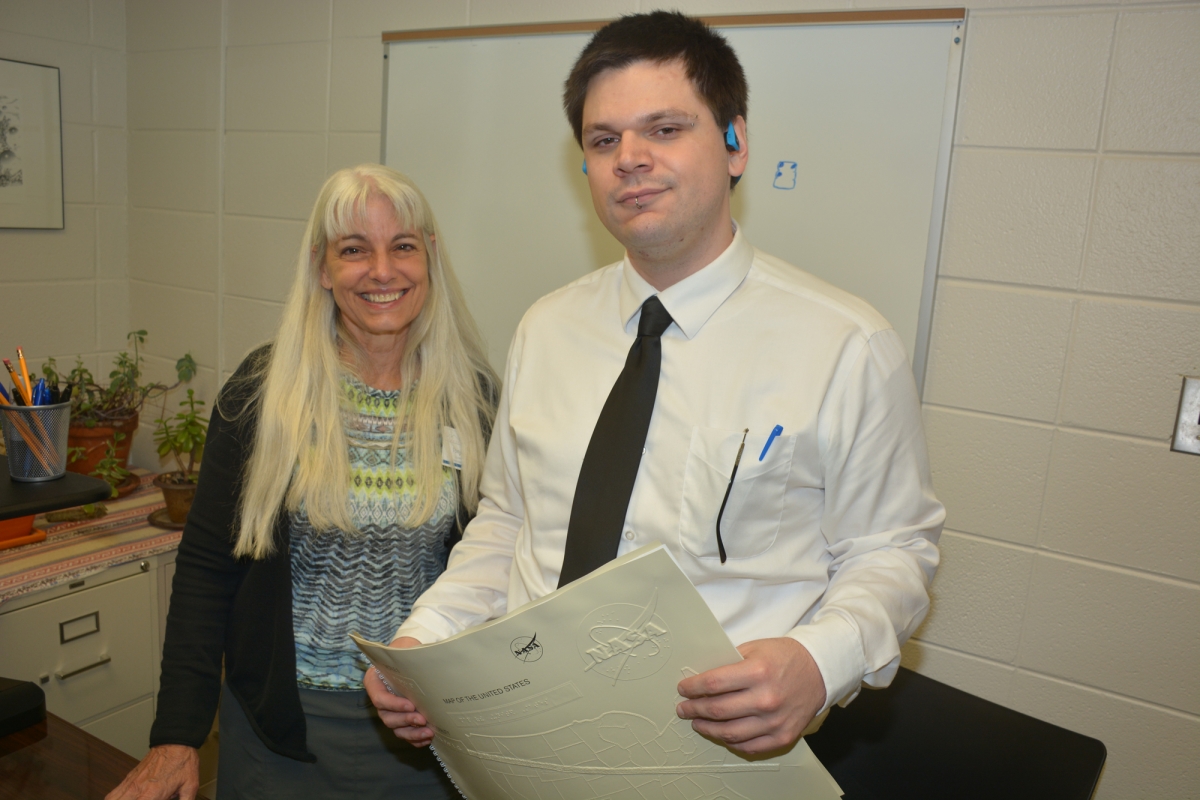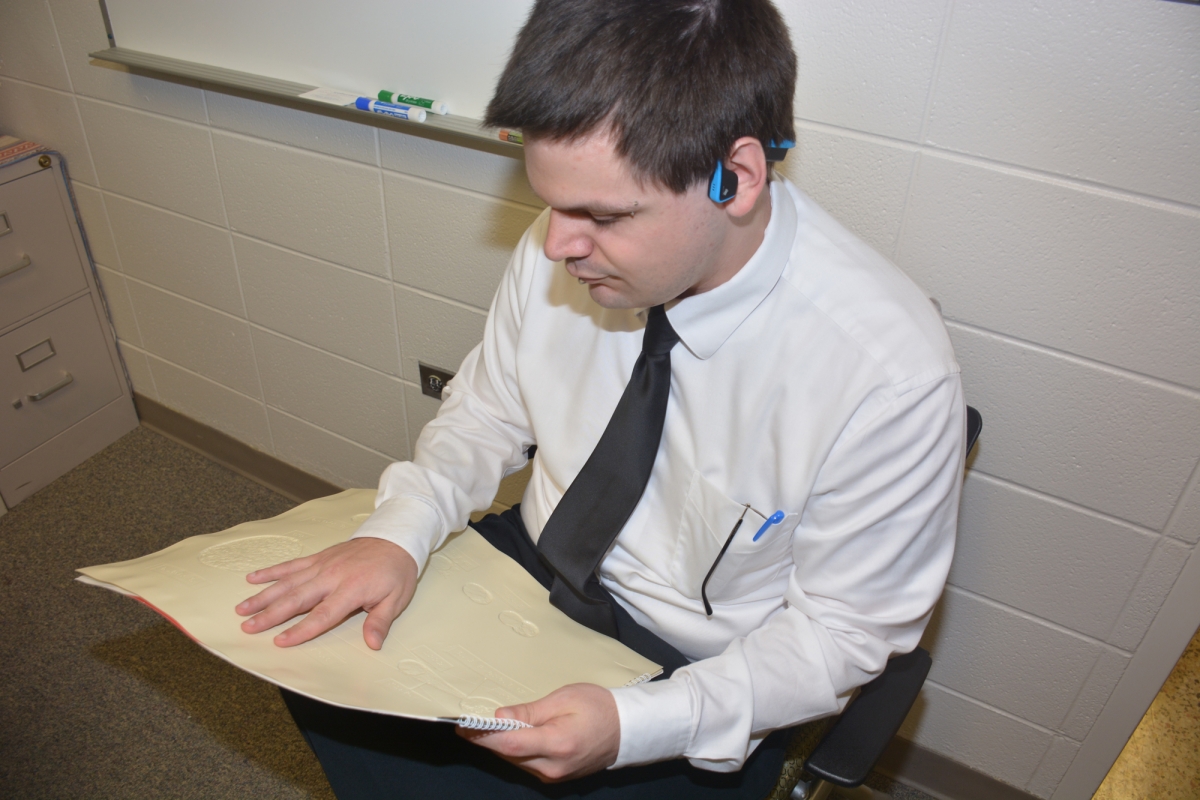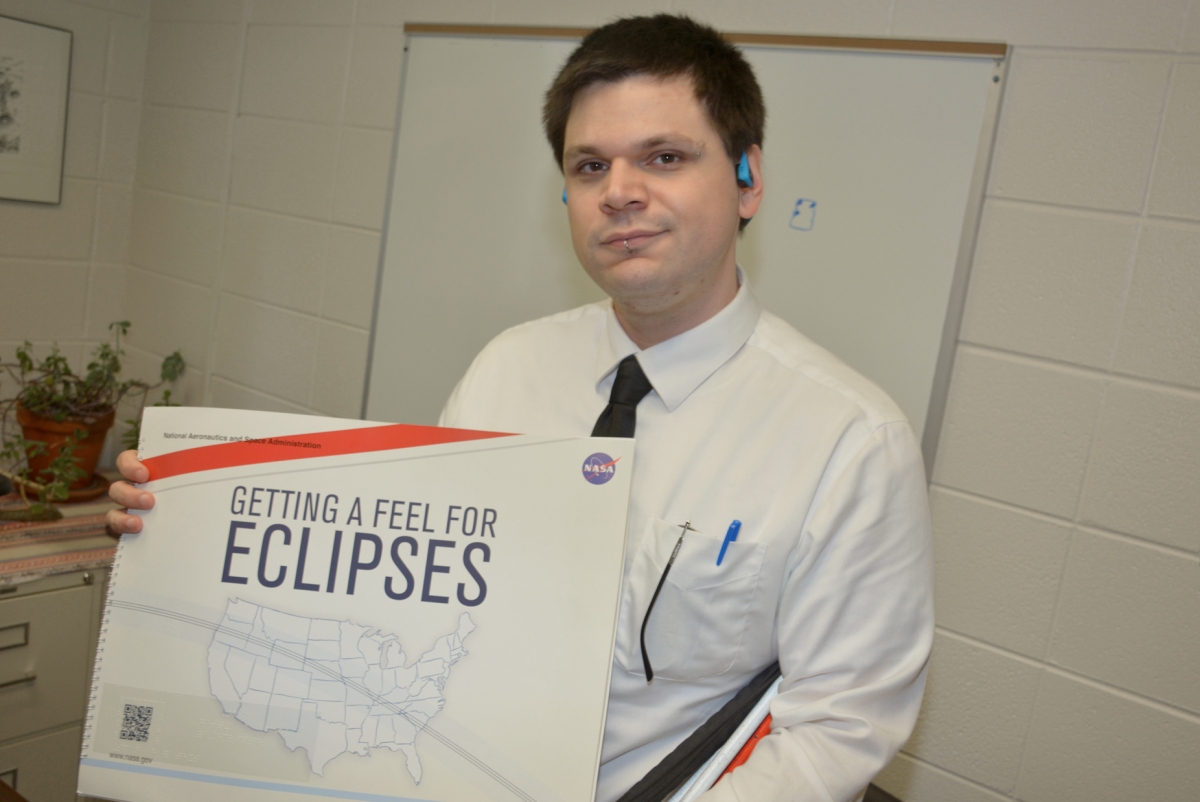 |
| Tonya Bassé (left) recently presented SCC student Clayton Ammons with a braille book about eclipses. The book was produced by NASA. |
Safe solar-viewing glasses were of no use to Clayton Ammons on Aug. 21.
Neither were telescopes, cameras or any of the other devices most folks used to enhance their eclipse-viewing experience in Western North Carolina.
Struck by retinitis pigmentosa in his early teenage years, Ammons’ vision went permanently dark nearly a decade ago. The blindness stole his ability to see colors or just about anything, but it hasn’t robbed him of his enthusiasm for life – and he was as excited as anyone about the opportunity to experience the region’s first total solar eclipse in more than 500 years.
Rather than being mesmerized by the “ring-of-fire” effect generated by totality, the 28-year-old Southwestern Community College student soaked in the moment through his other senses at home in Sylva.
“I wanted to see how the animals would react,” Ammons said, recalling his anticipation as the moon slowly covered up the sun. “When (the eclipse) started, I noticed there was no wind. It was stagnant. The birds got super quiet. There was a rapid temperature drop. It was like hot days in October.
“The crickets and katydids started freaking out as the eclipse got close,” he continued. “When the full eclipse happened, birds started to spazz out. Baby birds were crying for their moms. It wasn’t normal at all for that time of day. It was a combination of animal cycles being thrown off.”
To help visually impaired folks like Ammons learn more about how total eclipses work, NASA produced a book in braille and distributed several copies to SCC – the only community college in the nation to have a scientific partnership with the space agency.
Tonya Bassé, Southwestern’s student disability services coordinator, secured a copy from Matt Cass – SCC’s principal investigator on the NASA project – and presented the book to Ammons.
 |
| SCC student Clayton Ammons checks out the NASA eclipse braille book he received recently. |
 |
“It’s awesome that something like this exists,” Ammons said as his fingers traced the embossed pages. “I had no idea NASA even did something like this. I’m grateful to have it.”
A 2008 Smoky Mountain High graduate, Ammons lost all but a tiny fraction of his vision before he could start college. He can distinguish some bright lights from darkness, but he said any sight he does have is kind of like looking at the world through a McDonald’s straw.
There’s no hiding the disappointment that comes from losing a sense as precious as sight, but Ammons has worked through those natural emotions and found peace. And at SCC, he’s working toward a whole new direction for his life.
“In my dreams, I have perfect vision,” Ammons said. “I see the world as it was when I was a child. It’s so vivid that I almost don’t want to wake up.
“I experienced 20 years of decent sight,” he added. “Now I’m experiencing the world without sight. I’ve had plenty of time to come to terms with it.”
Inspired by a legally blind friend who’s become a millionaire businessman, Ammons attended a school where he learned to read braille in Raleigh. He then started at SCC and plans to continue pursuing his education until he gets a Ph.D. in clinical psychology.
Along the way, he’s appreciated the assistance of SCC employees like Bassé. Besides connecting him with the braille book about eclipses, she helped find a resource that helped immeasurably in a statistics class.
“Statistics is very visually based,” Ammons said. “The part of the brain that detects touch and sight is the same, and Tonya found a tool (tactile drawing board) that allows me to feel with my fingertips what the instructor was showing everyone on the board.
“Without Tonya, my college career wouldn’t be going as well as it is,” he said. “She goes out on her own to find tools that help me significantly.”
Ammons’ dream is to become a grief counselor and help people come to terms with difficult situations – not unlike an adjustment he’s made in his own life.
“Clayton is so comfortable with who he is as an individual,” Bassé said. “I’m incredibly impressed with how he carries himself and with how seriously he takes his education here. There’s no doubt in my mind he’s going to be a huge success in whatever he chooses to do in life.”
For more information about SCC and the programs it offers, visit www.southwesterncc.edu, call 828.339.4000 or drop by your nearest SCC location.

